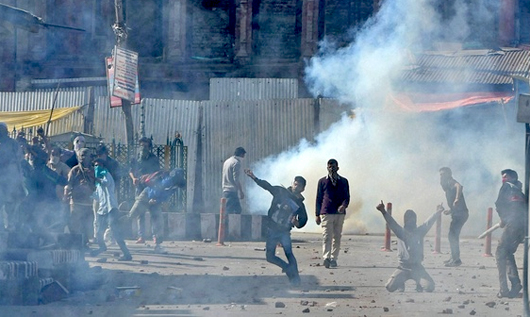
Srinagar, Apr 18: A young man was killed and two others injured in firing by the CRPF today during protests in Budgam district of Jammu and Kashmir where a strike has been called by the hardline Hurriyat faction against the killing of two youths in Tral earlier this week.
Authorities have placed several separatist leaders including moderate Hurriyat Conference chairman Mirwaiz Umar Farooq under "preventive" house arrest.
Three persons were injured when CRPF personnel opened fire to break up a demonstration at Narbal in central Kashmir's Budgam district. The injured were rushed to a hospital here where one of them identified as Suhail Ahmed Sofi succumbed to injuries.
The other youths are undergoing treatment, police said without elaborating on their condition.
A police spokesman said a preliminary inquiry into the incident indicated that the security forces had violated the Standard Operating Procedures (SOPs) during the incident. The exact nature of the violation of SoPs was not yet known.
"We regret the unfortunate incident and extend our sympathies to the bereaved family," the spokesman said.
A case under various sections of the RPC, including 302 (murder), has been registered at Magam police station.
Mirwaiz and some other separatist leaders were placed under house arrest this morning following fresh protests in some parts of the Valley over Tral killings. Two youths were killed at Tral in south Kashmir's Pulwama district in an army operation on Monday. While the army said they were militants, locals alleged the youths were shot dead in a fake encounter.
Authorities described the detention of separatists leaders as a "preventive measure" for maintaining law and order. The leader of the hardline Hurriyat Faction Syed Ali Shah Geelani is already under house arrest since Thursday night.
Meanwhile, the strike called by the hardline Hurriyat faction has evoked mixed response in the Valley which witnessed sporadic clashes between protesters and security forces. Tyres were burnt at some places to block traffic.
Shops, business establishments, educational institutions and petrol pumps were shut in and around Lal Chowk city centre in Srinagar, but those in the civil lines area and other major towns of the Valley were mostly open, officials said.
Sources said while public transport was sparse, private vehicles, cabs and auto-rickshaws plied normally.
Geelani had given the call for a strike against the Tral killings as also to protest against "unjustified and inhuman" arrests of Hurriyat leaders including Masarat Alam. PTI SSB MIJ DV SK sympathies to the bereaved family," the spokesman said.






Comments
Add new comment